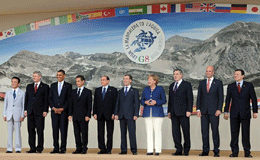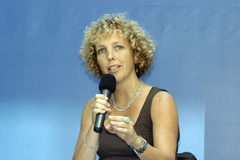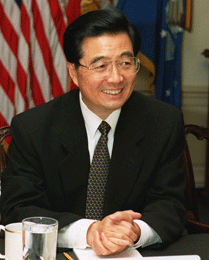Mired in the Mud on the Road to Copenhagen
Air Date: Week of July 10, 2009

G8 leaders failed to persuade developing countries to halve their emissions by 2050.
The Obama administration's debut at the World Economic Summit ends with little progress made toward a global climate change treaty expected by December in Copenhagen. The G8 agreed for the first time that a global temperature increase beyond 2 degrees Celsius would be dangerous, but didn't set goals that would encourage developing countries, like China and India, to reduce their greenhouse gas emissions. Host Steve Curwood talks with climate diplomacy expert Jennifer Morgan about how the world can work together to get back on the road to Copenhagen.
Transcript
CURWOOD: It’s Living on Earth, I’m Steve Curwood.
YOUNG: and I’m Jeff Young.
When the leaders of the G8 and major economies got together in Italy, they struck an agreement to prevent average global temperatures from rising more than two degrees Celsius, that’s about three and a half degrees Fahrenheit. And for the first time the G8 agreed to cut greenhouse gas emissions by 80 percent by 2050.
CURWOOD: But the G8 couldn’t agree among themselves on how to reach these goals, nor how to help developing countries decarbonize their growing economies. President Obama pledged to keep climate negotiations moving forward between now and the key meeting in December in Copenhagen.
Obama: Developed countries like my own have a historic responsibility to take the lead. We have the much larger carbon footprint per capita and I know that in the past the United States has sometimes fallen short of meeting our responsibilities, so let me be clear those days are over.
CURWOOD: Climate diplomacy expert Jennifer Morgan is with the environmental think tank E3G and joins us on the line now from Berlin. Tell me, Ms. Morgan, what do developed countries have to do to close the gap with developing ones such as China?

Jennifer Morgan. (Courtesy of Jennifer Morgan)
So they need to see incredible down payments for the short term, for 2020 from developed countries, and they need to see really pragmatic but very fundamental offers on financial support and on technology transfer. Last week Prime Minister Brown from the United Kingdom put a proposal on the table that would, through a range of public and private financing, gather $100 billion to support developing countries to adapt to climate change. Those types of proposals we need to see many more of.
CURWOOD: $100 billion dollars from the world.
MORGAN: Yes, $100 billion dollars from the world.
CURWOOD: So this was the Obama administration’s first appearance on the world summit’s stage on climate change. How did America do?
MORGAN: Well I think so you a fundamental change from the previous eight years from these G8s on climate change. You see the adoption of a goal that the world, including the United States, has now said, you know, if you go above 3.5 degree increase in temperature it’s too much – the impacts are too much. And that I think is a real fundamental shift. And President Obama was there. He adopted that. And from that perspective, I think, you see just a massive difference in the way that the G8 has approached this problem.
CURWOOD: Still, at this point, it looks like the U.S. Congress is willing to do less than what the European Union says it would like to have for example. So how can President Obama walk that line and still get a credible deal in Copenhagen?

Chinese President Hu Jintao. (Photo: Helen C. Stikkel, Courtesy of the Department of Defense)
CURWOOD: Now this was supposed to be President Obama’s chance to talk with the Chinese President Hu, but of course, Mr. Hu has some civil unrest back home – he had to go home before he really could talk about this at the climate meeting.
MORGAN: Yes, very unfortunate, I think. And I think that took certainly some of the dynamic out of the meeting. But there is a very strong dialogue happening between the U.S. and China right now on climate change and energy and I think they’ve gotta find another time to talk soon.
CURWOOD: Jennifer Morgan, it seems pretty clear what everybody wants in terms of the climate. Nobody wants to go over 3.5 degrees Fahrenheit. The developing countries want the tools to decarbonize. The developing world wants to have a level playing field. What’s the problem with getting to an agreement?
MORGAN: I think fundamentally now it’s a problem of leadership and courage. You have a game of chicken going on, and people not wanting to blink first.

G8 leaders failed to persuade developing countries to halve their emissions by 2050.(Courtesy of the G8)
CURWOOD: Jennifer Morgan is global climate change director of the environmental think tank E3G. Ms. Morgan thanks for your time.
MORGAN: Thank you very much.
[MUSIC: Martial “Cette Fille” from “Putumayo Presents: Euro Groove” (Putumayo World Music 2008)]
Links
Read the Union of Concerned Scientists’ statement on this year’s G8 summit.
Living on Earth wants to hear from you!
Living on Earth
62 Calef Highway, Suite 212
Lee, NH 03861
Telephone: 617-287-4121
E-mail: comments@loe.org
Newsletter [Click here]
Donate to Living on Earth!
Living on Earth is an independent media program and relies entirely on contributions from listeners and institutions supporting public service. Please donate now to preserve an independent environmental voice.
NewsletterLiving on Earth offers a weekly delivery of the show's rundown to your mailbox. Sign up for our newsletter today!
 Sailors For The Sea: Be the change you want to sea.
Sailors For The Sea: Be the change you want to sea.
 The Grantham Foundation for the Protection of the Environment: Committed to protecting and improving the health of the global environment.
The Grantham Foundation for the Protection of the Environment: Committed to protecting and improving the health of the global environment.
 Contribute to Living on Earth and receive, as our gift to you, an archival print of one of Mark Seth Lender's extraordinary wildlife photographs. Follow the link to see Mark's current collection of photographs.
Contribute to Living on Earth and receive, as our gift to you, an archival print of one of Mark Seth Lender's extraordinary wildlife photographs. Follow the link to see Mark's current collection of photographs.
 Buy a signed copy of Mark Seth Lender's book Smeagull the Seagull & support Living on Earth
Buy a signed copy of Mark Seth Lender's book Smeagull the Seagull & support Living on Earth

